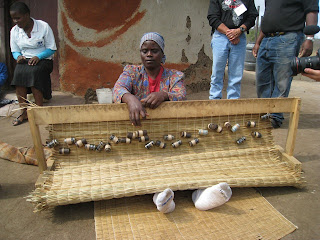It’s a grey and dreary day, but no rain yet. Soon the rains will begin, the crops will be planted and the country will become green again. But hope doesn’t come with rain or even food anymore in this tiny Kingdom.
I can’t help but be caught in the confusion of the two worlds that collide here. Although I hate to make this blog about “color”, there seems to be a “black” Swaziland and a “white” Swaziland. I hope this blog will not be seen as offensive, that is not my intent. I am simply trying to put on paper (maybe just for my own self-awareness) what I see on a daily basis and the world which my family is about to move in to.
White Swaziland seems to be made up of people with nice (western) homes, 4 wheel drive vehicles, weekly visits to the local Pick’n’Pay grocery store, children in school, dinner parties with friends and family and general talk of the weather when there is nothing else to say. This is a general observation and does not apply to all.
Black Swaziland seems to made up of traditional homes built with sticks and mud, once erect and proud, beautifully adorning the Swazi countryside, now crumbling and washing away because the owners have either died or are too old (or young), or sick to care for their homestead. There are no grocery stores within walking distance, no money to buy food if there was a store and no energy (or seeds or fertilizer) to plant this year’s garden because of poor health and nutrition. This also is a general observation and does not apply to all.
Many (most) schools are closed now because the government hasn’t paid the 2nd semester school fees for the 1st and 2nd grade orphans of the nation. You see, in 2010 His Majesty King Mswati III generously offered to pay the school fees for all children in first grade who were orphaned and who had no parent to pay their school fees. Read this part carefully please: the country has a population of 950,000 people and His Majesty paid fees for 120,000 orphaned children who needed to go to FIRST grade only. That means that 12.6% of the total population is approximately age six. In 2011 he offered to pay for first and second grade fees for orphaned children. While it is believed that His Majesty has given the funds to the Ministry of Education but they have not passed on those funds to the school level (to pay the teachers for last semester) so, the schools are closed until further notice.
Dinner parties in “black Swaziland”? The celebrations and gatherings of past generations seem to have gone away as quickly as the food that used to be present at them. Buthusile Vilakati, a local 43 year-old woman who is caring for 11 children/grandchildren, has been too sick to work so when there is no food to give her children she goes to visit her neighbors and humbly asks if they will share theirs with her family – some dinner party eh?
And weather? Well, I don’t hear much talk of the weather in “black Swaziland” because no one seems to have the energy or desire to just make small talk. Conversations are about things of importance or there is silence. As a friend once said, “in Swaziland, silence is the loudest sound”.
While color is often a taboo subject to write or talk about, the fact is that my skin is really really white and my hair is blond and I don’t look like most of my new neighbors. But I know that Jesus loves me just as much as He loves all of the people of Swaziland and the people of the world. He allowed me to be born in a first world nation and be raised in a family who had a nice apartment, dependable car, a grocery store next door, a (free) school across the street, the occasional pot luck dinner and lots of small talk when there was nothing else important to say. But was that really better?
“Blessed are the poor in spirit for theirs is the Kingdom of Heaven” Matthew 5:3.
The Message translation of Matthew 5:3 says, “You're blessed when you're at the end of your rope. With less of you there is more of God and his rule.”
It seems that having all the comforts of living in the western world make it hard to be “poor in spirit”. When we are at the end of our rope we have many distractions to turn to (TV, shopping, entertainment, food, addictions etc). When someone has nothing but God to rely on is there is a greater opportunity to be less and have Him be more?
I look forward to being Buthusile’s neighbor, not so that I can deliver food to her and treat her as a pet project or charity case, but rather to spend time with her and get to know her as a neighbor. She weaves beautiful mats out of grass – maybe I can help her sell them? Maybe I can provide a word of encouragement while helping her fetch water from the river some days. Maybe I can be the hands and feet of Jesus. Maybe I can just sit in silence and enjoy the moment when there is nothing important to say.
Pondering in Swaziland.
Janine

Such a beautiful, but heart wrenching post... Please keep sharing your heart like this!! Hugs and prayers! Sharla
ReplyDelete